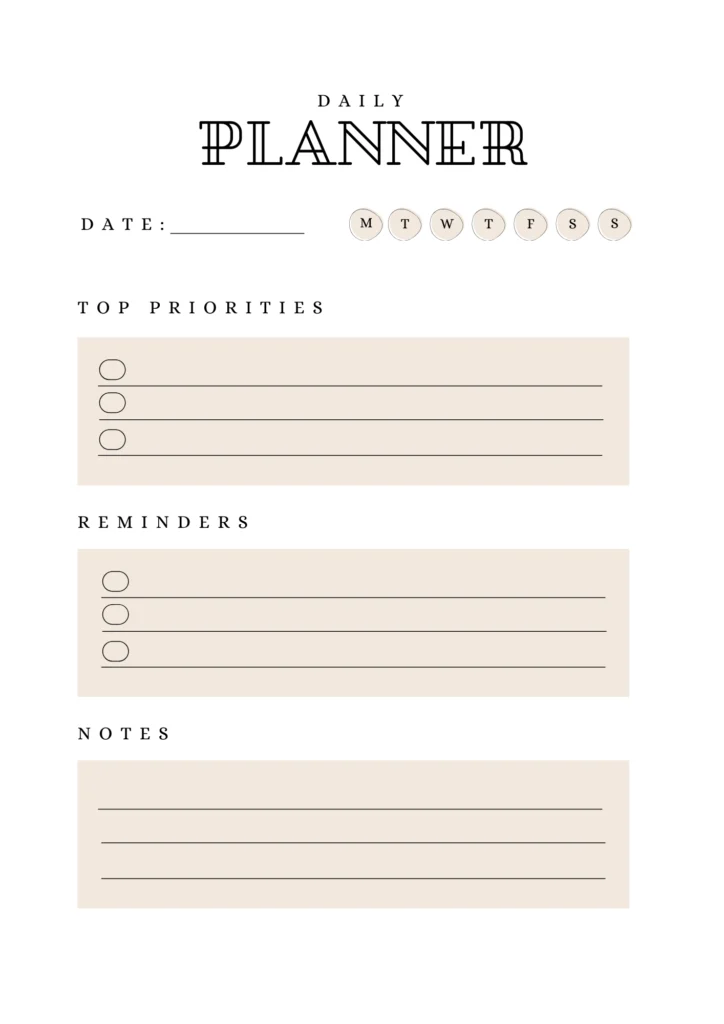You’ve tried digital apps, bullet journals, sticky notes, and countless productivity systems. Some worked for a few weeks, others never got off the ground. Yet here you are, still feeling like your life is scattered across a dozen different places, still searching for that one method that will finally help you organize your life.
The problem isn’t that you’re lazy or disorganized by nature. The real issue is much simpler: most of us are trying to organize our entire lives without mastering the foundation of daily planning.
Why Organization Feels So Hard
I spent years jumping between different systems, convinced that the next app or method would be the magic solution. Digital tools promised seamless synchronization across devices. Bullet journals offered complete customization. Complex productivity systems guaranteed life transformation.
Each method had genuine benefits, and I’m not here to bash any particular approach. The issue wasn’t with the tools themselves, but my expectation that any single system could instantly organize my life without me developing the underlying habit of daily planning.
Most organization attempts fail because we focus on the wrong thing. We obsess over finding the perfect tool instead of building the simple daily practice that makes any tool effective. It’s like searching for the perfect running shoes while never going for a jog.
The Missing Foundation
Through my work with Plan and Simplify, I’ve noticed that people who successfully organize their lives share one common trait: they plan their days consistently. Not perfectly, not with elaborate systems, but consistently.
They might use different tools, some prefer digital, others paper, many use a combination. But they all have a daily ritual of deciding what matters most and writing it down somewhere they’ll see it.
This daily planning habit is what separates people who stay organized from those who struggle with constant overwhelm. Without this foundation, even the most sophisticated system eventually crumbles under the weight of real life.
Why Daily Planning Matters More Than Your Tools
I used to think organization was about having the right system. After years of experimentation and helping others through Plan and Simplify, I’ve learned that organization is really about developing one simple habit: taking a few minutes each day to clarify your priorities and write them down.
Your tool choice matters far less than your consistency. A simple piece of paper used daily will organize your life better than the most advanced app used sporadically.
This realization changed how I approach planning completely. Instead of searching for the perfect system, I focused on creating the simplest possible daily ritual that I could maintain even on chaotic days.
The Daily Planner That Makes Organization Simple
After years of experimenting with different systems through Plan and Simplify, I created a daily planner that addresses the core challenge most people face: how to organize your life when you’re already overwhelmed. Instead of adding complexity, this planner strips daily planning down to three essential elements that anyone can use consistently.
The layout is intentionally clean and spacious. At the top, you’ll find circles for each day of the week, so you can easily see what day you’re planning for. The date field sits prominently at the top, making it easy to reference later.
The “Top Priorities” section features three checkbox lines with plenty of space for writing. This is specifically for the three most important things that will make your day feel successful. The soft beige background creates a visual boundary that prevents you from cramming too much into this crucial section.
Below that, the “Reminders” section has three more checkbox lines for those smaller tasks that easily slip through the cracks. Returning phone calls, scheduling appointments, picking up dry cleaning, the mundane stuff that creates stress when forgotten but doesn’t qualify as a top priority.
The “Notes” section at the bottom provides lined space for thoughts, ideas, and information that doesn’t fit neat categories. Meeting notes, grocery items, random insights, phone numbers, all the little pieces of information that accumulate throughout your day need a home where you can find them later.
How This Differs From Complex Systems
After trying countless productivity methods, I wanted to create something that would work even on my worst days. The daily planner I designed intentionally avoids the complexity that makes other systems fail when life gets messy.
| Simple Daily Planning | Complex Organization Systems |
|---|---|
| One page per day | Multiple apps, tools, and methods |
| Three basic sections | Elaborate categories and workflows |
| Five minutes to set up | Hours of initial setup and learning |
| Works with any writing tool | Requires specific software or supplies |
| Adapts to interruptions | Breaks down when life gets messy |
The beauty of this approach is its flexibility. Your daily planner works whether you’re having a productive day or dealing with constant interruptions. The structure remains consistent, but the content adapts to your reality.
Building the Daily Planning Habit
Starting a new organizational habit while your life already feels chaotic seems counterintuitive. The key is beginning with something so simple that it feels almost trivial.
I recommend starting with just the priorities section. Each morning, write down the three most important things you want to accomplish that day. Don’t worry about time estimates or detailed scheduling. Just identify what matters most.
After a week of consistent priority setting, add the reminders section. Use this space for those nagging little tasks that you keep meaning to handle. The act of writing them down gets them out of your head and ensures they don’t disappear.
The notes section comes last, once daily planning feels natural. This becomes your catch-all space for information that needs a temporary home until you can process it properly.
Overcoming Common Planning Obstacles
The biggest obstacle to daily planning is the belief that your days are too unpredictable for planning to matter. This thinking has it backward. Unpredictable days are exactly when you need planning most.
When unexpected things happen (and they always do), having your priorities clearly written down helps you quickly decide what can wait and what can’t. Instead of feeling completely derailed, you can make conscious choices about how to adjust your day.
Another common obstacle is perfectionism. People abandon daily planning because they miss a few days or don’t complete everything on their list. This misses the point entirely. The goal is building awareness of your priorities and creating a habit of intentional daily choices.
Some days you’ll complete everything on your list. Other days you’ll accomplish one priority and spend the rest of the day handling emergencies. Both outcomes are fine as long as you approach the day with clarity about what mattered most.
Why Paper Planning Still Works
Despite living in an increasingly digital world, there’s something powerful about putting pen to paper that makes daily planning more effective. I’ve tested countless digital tools, and while they have their place, paper planning offers unique advantages for building sustainable organization habits.
Paper has no learning curve, never needs updates, and creates zero distractions. When you open a notebook, you see your priorities, not notifications, messages, or the temptation to check social media.
The physical act of writing also engages your brain differently than typing. You process information more deeply when you write by hand, which improves both memory and commitment to your plans.
Paper planning also provides natural constraints. You can’t endlessly expand your to-do list because you run out of space. This limitation forces you to prioritize realistically instead of creating impossible expectations for your day.
Ready to Organize Your Life? Get Your Daily Planner
If you’re tired of feeling scattered and want to finally organize your life with a system that works, I’ve created a simple daily planner template that you can start using immediately. No complicated setup, no learning curve, just a clean, effective tool for daily planning.
Download the free daily planner template and start building the habit that will transform how you approach each day. When you stop searching for the perfect system and start building a simple daily practice, everything else becomes easier.

Making Daily Planning Sustainable
The key to long term success with daily planning is making it as easy as possible to maintain. This means choosing a format that works even when you’re tired, stressed, or dealing with unexpected challenges.
Your daily planner should live somewhere you’ll see it regularly. Kitchen counter, desk, bedside table, anywhere you naturally spend time each morning. Visibility is crucial because out of sight truly means out of mind when building new habits.
Planning the night before eliminates morning decision fatigue and starts your next day with a clear direction. Just five minutes of evening preparation can transform how your entire next day unfolds.
Regular weekly reviews help you notice patterns and adjust your approach. Are you consistently overcommitting? Underestimating how long tasks take? These insights help you organize your life more effectively over time.
FAQ: Common Questions About Organizing Your Life
I plan my life by breaking it into manageable steps. This includes setting goals, creating a master schedule, and using tools like free planners and AI to stay on track. Reflecting regularly and adjusting plans as needed is also key.
Start by decluttering both your physical and mental space. Build routines, create a master schedule, and use tools like AI to simplify tasks. Most importantly, focus on one thing at a time and avoid overcommitting.
Write down your goals.
Plan your day the night before.
Use task batching.
Embrace AI tools like ChatGPT.
Regularly reflect and adjust your plans.
AI can help streamline many aspects of your life, from generating to-do lists to meal planning. Tools like ChatGPT can save you time and energy by providing tailored advice and solutions.
Beyond Daily Planning
Here’s what I’ve learned through Plan and Simplify: when you master daily planning first, every other organizational system becomes easier to implement and maintain. You develop the habit of regular check-ins with yourself, which makes you more aware of what’s working and what isn’t.
When you stop searching for the perfect system and start building a simple daily practice, everything else becomes easier. Your stress decreases, your productivity increases, and most importantly, you regain control over your days instead of feeling like they’re controlling you. Sometimes the most effective solutions are also the simplest ones, and this daily planner provides exactly that kind of straightforward approach to help you organize your life.
